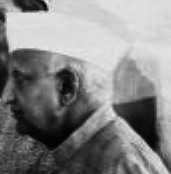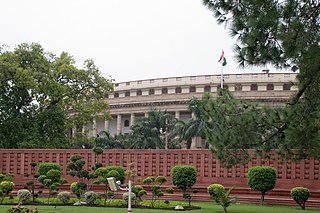
The Pakistan Movement or Tehrik-e-Pakistan was a religious political movement in the 1940s that aimed for and succeeded in the creation of Pakistan from the Muslim-majority areas of the British Indian Empire.
The three Round Table Conferences of 1930–32 were a series of peace conferences organized by the British Government and Indian national congress was participant to discuss constitutional reforms in India. These started in November 1930 and ended in December 1932. They were conducted as per the recommendation of Jinnah to Viceroy Lord Irwin and Prime Minister Ramsay MacDonald, and by the report submitted by the Simon Commission in May 1930. Demands for Swaraj, or self-rule, in India had been growing increasingly strong. Mohammad Ali Jinnah, Mahatma Gandhi, Sir Tej Bahadur Sapru, Srinivasa, Sir Muhammad Zafrulla Khan and Mirabehn are key participants from India. By the 1930s, many British politicians believed that India needed to move towards dominion status. However, there were significant disagreements between the Indian and the British political parties that the Conferences would not resolve. The key topic was about constitution and India which was mainly discussed in that conference.There were three Round Table Conferences,(1930-1932).
Rai Bahadur, abbreviated R.B., was a title of honour bestowed during British rule in India to individuals for their service to the Empire. The title was accompanied by a medal called a Title Badge. Translated, Rao means "prince", and Bahadur means "brave" or "most honourable". The equivalent title for Muslim and Parsi subjects was Khan Bahadur. For Sikhs it was Sardar Bahadur.
The All India Muhammadan Educational Conference was an organisation promoting modern, liberal education for the Muslim community in India. It was founded by Sir Syed Ahmed Khan, also the founder of the Aligarh Muslim University. All India Mumammadan Educational Conference was the origin of the All-India Muslim League. The Muslim League was born in the 20th session of All India Muhammadan Educational Conference, which was established by Syed Ahmed Khan in Aligarh in 1886. Muhammadan Educational Conference used to hold its annual meetings in various cities where, by the co-operation of local Muslims, steps were taken for the progress of education.

The Imperial Legislative Council was a legislature for British India from 1861 to 1947. It succeeded the Council of the Governor-General of India, and was succeeded by the Constituent Assembly of India and after 1950, was succeeded by Parliament of India.
The Council of State was the upper house of the legislature for British India created by the Government of India Act 1919 from the old Imperial Legislative Council, implementing the Montagu–Chelmsford Reforms. The Central Legislative Assembly was the lower house.

General elections were held in British India in 1934. The Indian National Congress emerged as the largest party in the Central Legislative Assembly.

General elections were held in British India in 1920 to elect members to the Imperial Legislative Council and the Provincial Councils. They were the first elections in the country's modern history.

General elections were held in British India in November 1923 for both the Central Legislative Assembly and Provincial Assemblies. The Central Legislative Assembly had 145 seats, of which 105 were elected by the public.

General elections were held in British India between 28 October and late November 1926 to elect members of the Imperial Legislative Council and the Provincial Legislative Councils.
The New Year Honours 1913 were appointments by King George V to various orders and honours to reward and highlight good works by members of the British Empire. They were announced on 3 January 1913.
The New Year Honours 1910 were appointments by King Edward VII to various orders and honours to reward and highlight good works by members of the British Empire. They were announced on 4 January 1910.
The New Year Honours 1909 were appointments by King Edward VII to various orders and honours to reward and highlight good works by members of the British Empire. They were announced on 5 January 1909.
The 1931 New Year Honours were appointments by King George V to various orders and honours to reward and highlight good works by citizens of the United Kingdom and British Empire. They were announced on 30 December 1930.
The 1924 New Year Honours were appointments by King George V to various orders and honours to reward and highlight good works by members of the British Empire. They were published in The London Gazette on 1 January 1924.
The New Year Honours 1921 were appointments by King George V to various orders and honours to reward and highlight good works by members of the British Empire. They were published on 31 December 1920.
The New Year Honours 1903, announced at the time as the Durbar Honours, were appointments to various orders and honours of the United Kingdom and British India. The list was announced on the day of the 1903 Delhi Durbar held to celebrate the succession of King Edward VII and Queen Alexandra as Emperor and Empress of India. The membership of the two Indian Orders were expanded to allow for all the new appointments.
The New Year Honours 1907 were appointments by Edward VII to various orders and honours to reward and highlight good works by members of the British Empire. They were published on 1 January 1907.
The 1911 Delhi Durbar was held in December 1911 following the coronation in London in June of that year of King George V and Queen Mary. The King and Queen travelled to Delhi for the Durbar. For the occasion, the statutory limits of the membership of the Order of the Star of India and the Order of the Indian Empire were increased and many appointments were made to these and other orders. These honours were published in a supplement to the London Gazette dated 8 December 1911.








